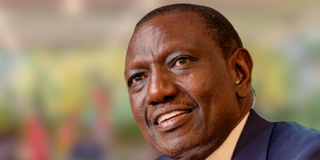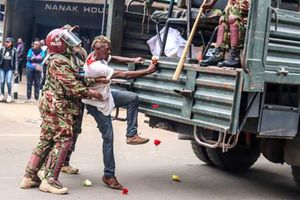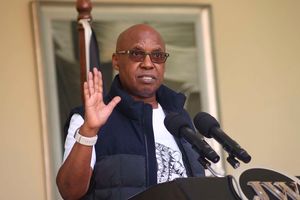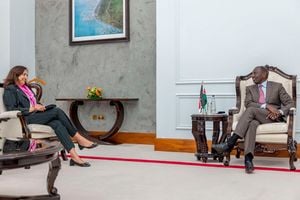
Orange Democratic Movement leader Raila Odinga (left) and President William Ruto.
Groups of youthful protesters defied the authorities and shut down Nairobi as President William Ruto's latest political moves appeared to be paying off as the rest of the country remained calm on Thursday, August 8.
The Gen Zs had called for what they dubbed the mother of all mass protests - the 'Nane Nane' march - to continue their push to hold the government to account and force the departure of the current regime.
Read: Nane Nane: Peaceful demos disrupted by violent police in Nairobi, youths in Coast and Western keep off streets
But the much-hyped protests largely failed in most parts of the country, with youths in Coast, Nyanza and Western Kenya staying off the streets.
Previous hotspots such as Kisii were largely calm, with political analysts citing the deal between President Ruto and opposition leader Raila Odinga as a major reason why the protests lost their initial momentum.
In Nairobi, protesters battled police who fired teargas and engaged in running battles, forcing businesses in the capital to close on a day when President Ruto swore in 19 cabinet ministers, including four from Mr Odinga's Orange Democratic Movement (ODM).
President Ruto appointed John Mbadi to take charge of the crucial National Treasury and Economic Planning portfolio, Hassan Joho (Mining and Blue Economy CS), Wycliffe Oparanya (Cooperatives and MSMEs) and Opiyo Wandayi as Energy Cabinet Secretary.
Loud gunshots and tear gas canisters rang out in the central business district, while police set up roadblocks on major highways to prevent protesters from entering the city.
Read: Oath of office: An unnecessary act according to ignored court advisory
Major concessions by the president, including the withdrawal of the 2024 Finance Bill and the dissolution of the cabinet, are also some of the major moves that have taken the steam out of the protests, which peaked on June 25 when the youth protesters broke into parliament.
There has also been a major crackdown on some of the political players accused by the state of infiltrating and mobilising the demonstrations.
Embakasi North MP James Gakuya and his Embakasi Central counterpart Benjamin Mejja Donk, both allies of Deputy President Rigathi Gachagua – have been questioned over alleged links to the protests.
However, on Tuesday, August 6, the High Court issued an order preventing the police from arresting or detaining them.
The authorities have also launched a major crackdown on people accused of 'commercial activism'. Several have been arrested and others charged for their involvement in the protests. The authorities have also gone after civil society groups, accusing them of facilitating the protests.
Nation has also established that a financial institution flagged some questionable cash inflow believed to have been wired to facilitate the protests.
Read: From anthem to agony: Artiste who sang in praise of Ruto now living in fear
Further, the President is also said to be receiving the right and timely intelligence briefs. The intelligence reports have been crucial for the authorities in countering the protests.
Mr Odinga on Monday, August 5, while speaking at Toi Market, said the broad-based government would respond to the needs of the protesting youths by improving governance and service delivery to the people. “We have given him experts, you will now see things changing,” said the ODM party leader.
Prof Macharia Munene, a political analyst, said Mr Odinga commands a huge following in the country that cannot be ignored. He said there could be other dynamics at play in the dying off of the protests, but Mr Odinga’s factor remains a major one.
“There are many dynamics to it. There is the feeling of infiltration and hijacking by other players, making some of the youths to keep off the protests. There is the Raila factor. He has a huge following. This can explain why some parts of the country that have in the past been hotspots were not protesting,” said Prof Munene.
Youth in the Coast region stayed away from the streets in Mombasa, Kilifi and Kwale areas with the majority saying the nomination of Mr Joho and Salim Mvurya as CSs is a good gesture for the region.
"We are happy with the swearing-in of Mr Joho this morning, we will use different avenues to seek a bigger cake in government. But with Joho, we know we can have more," said Salima Hussein, a Mombasa resident.
Some of the Gen Zs described the former Mombasa governor as one of their own and that they now feel part of President William Ruto's government.
Speaking in Lamu Island, the Gen Z insisted that they do not see any reason to picket as they are confident with the new team of Cabinet Secretaries that were sworn in on Thursday.
"We have decided that instead of protesting, we will join hands to celebrate the swearing-in of Hassan Ali Joho as CS for Mining, Blue Economy and Fisheries. He's from the Coast. He's also an artist. We believe that his inclusion in President William Ruto's cabinet will give the Kenya Kwanza government the impetus to deliver on its promises," said Mohamed Omar, a prominent Gen Z protester in Lamu Old Town.
Prof Munene also said that the question of what happens if President Ruto is kicked out has also slowed down the protests.
Mr Odinga's elder brother, Dr Oburu Oginga, recently said the country was better off with President Ruto than with Mr Gachagua as head of state.
"While they are all bad leaders, Gachagua is unapologetically shameless and has publicly declared the country a shareholding entity," he said during a press conference in Kisumu on July 14.
Democratic Action Party of Kenya (DAP-K) deputy party leader Ayub Savula said there was no solid agenda to rally the youths. He said most of their initial demands have been met by the President.
"The president has met most of their demands. This has caused the protests to lose momentum," said Mr Savula.
ODM Nairobi Chairman George Aladwa, who is also the Makadara MP, said the youths should now give the President and his new Cabinet time to serve the people of Kenya. Mr Aladwa said the President has listened to the youth and addressed some of their demands, including withdrawing the Finance Bill, 2023.
“The President disbanded his Cabinet, which was a sign of goodwill in responding to the demands made by the youths. We cannot solve the challenges facing the country by going to the streets daily,” said Mr Aladwa.
Jubilee Secretary General Jeremiah Kioni, however, described the protests as a success. He accused the police of using excessive force against the protesters in total violation of the constitution. He said the fact that the capital city was deserted was a sign that the public had rejected President Ruto’s administration.
“The people have totally rejected this administration. They tried to use excessive force but the protest was still a success. There was a total shutdown of the town,” said Mr Kioni.
Prof David Monda, a university lecturer and political analyst, said the political deal between President Ruto and Mr Odinga may not offer a lasting solution to the issues raised by the protesters.
“Remember, the protests by Gen Z are reflective of broader societal concerns about poor governance, corruption, lack of transparency and accountability. The Raila/Ruto deal appears as a secretive political deal between two politicians looking to come into a political compromise to calm the waters of the persistent protests,” said Prof Monda.
“To make matters worse, what was supposed to be a "vetting" of cabinet nominees, has shown Kenyans just how rotten the system is. Ruto’s new cabinet is worth close to Sh15 billion (about $120 million) with many nominees unable to justify how they accrued their wealth or how their assets appreciated with unexplainable pace,” he added.
[email protected]











